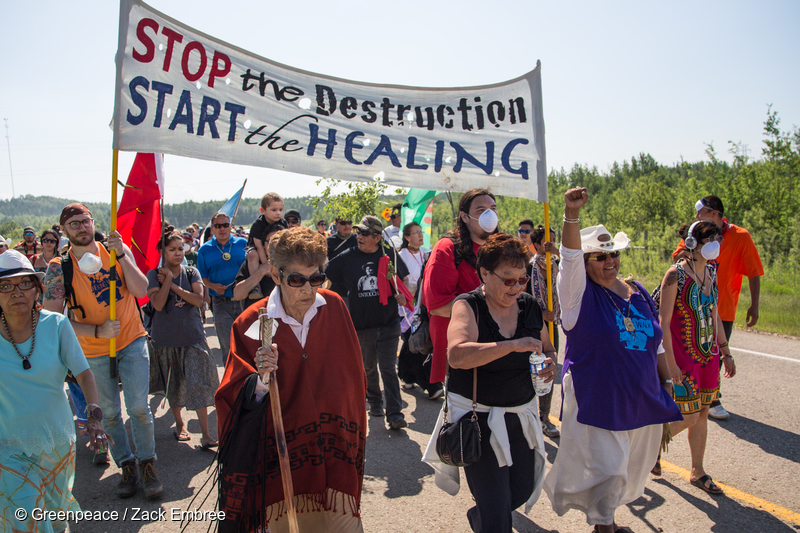The Alberta government’s “Public Inquiry into Anti-Alberta Energy Campaigns” is set to label Greenpeace as “anti-Albertan,” as part of a broader effort to intimidate and silence critics of the oil industry.
It won’t work.
When Greenpeace Canada opened an office in Alberta in 2007, we did so because the tar sands were not only the fastest rising source of greenhouse gas emissions in the country, but were also the third-largest oil reserve on the planet at a time when we knew climate change was reaching a critical tipping point. We did so because Indigenous rights were being violated, and because we wanted to support the critical work of local communities.

We advocated for three big things. An immediate end to the expansion of the tar sands — a once radical position now adopted by the International Energy Agency. Cleaning up existing harms, like the toxic tailings ponds that still threaten water supplies. And finally, a plan to transition from fossil fuel production to renewable energy that protects affected workers and communities, a position that is also now supported by the International Energy Agency and is in fact the cornerstone of their recent guide.
Greenpeace Canada is proud of that work. We make no apology for demanding science-based solutions that match the scale of the climate and biodiversity crises, even when it makes powerful interests uncomfortable. And we will press on, alongside Indigenous leaders and front-line communities, and with the backing of our supporters — no matter what intimidation tactics are thrown our way.
In just one week, the Inquiry’s Commissioner Steve Allan will finally submit his much-delayed report. In Greenpeace’s response to the Inquiry’s draft report we defend our work to promote a phase-out of fossil fuels that protects workers and communities. We also make recommendations on how the draft report – only portions of which we have been allowed to review – should be changed to acknowledge the reality and severity of climate change. Lastly, we call on Commissioner Allan to remove support for baseless conspiracy theories and to recognize the importance of democratic debate on what to do about the climate threat.
While the Commissioner acknowledges that our organization has done nothing illegal, dishonest or that could in any way be impugned, the substance of his report unfairly vilifies and stigmatizes Greenpeace Canada as being “anti-Alberta” — for no reason other than the fact that we have engaged in public interest environmental advocacy to address a challenge of unprecedented magnitude.
When it comes to Greenpeace’s work in the tar sands, it was our staff in Alberta who led the call, passionate about the planet, about their communities, and about the places where they lived and had grown up. Our supporters in Alberta rallied to the cause, volunteering time and funds, writing letters, attending protests.
So what does it mean to be “anti-Alberta” according to Allan’s report? As we lay out in our response to the Inquiry’s draft report, Commissioner Allan casts such a wide net (despite what appears in the legally binding Terms of Reference for the Inquiry) that the term “anti-Albertan” seems to apply to anyone or anything related to environmental protection. Anywhere.
Climate cases filed in courts by children in the US and 13 other countries, but not in Alberta? Anti-Alberta.
The Toronto Regional Conservation Authority (TRCA) working to safeguard and enhance the health of watershed communities in Ontario? He can’t say for certain that they aren’t Anti-Alberta, so he adds their budget to the total.
The “ExxonKnew” lawsuits launched in numerous states targeting Exxon’s global operations and its history of climate science denial campaigns? All Anti-Alberta, according to the Commissioner.
Climate science is clear: to avoid the worst impacts of climate change, global temperature rise must be limited to 1.5ºC. It is also clear that to reach these goals, we must drastically reduce the use of fossil fuels globally. If we are to succeed, this means that the Alberta tar sands must not be exploited. Summers of drought and crop failures, heatwaves and a heat dome, and raging wildfires have made it abundantly clear that the climate crisis is happening right here, right now.
By labeling crucial climate action work as anti-Alberta, it appears Commissioner Allan is attempting to put a chill on public participation and free expression of ideas in a free and open society.
It appears he is attempting to intimidate advocates who speak up for the good of our planet, the most affected communities, and us all. Being labelled anti-Alberta has consequences for individuals and organizations’ reputation and personal safety. But we will not be silenced. We will not be intimidated. We will continue to work in favour of climate science, in favour of free speech and in favour of a just and green transition for all, including Albertans.
